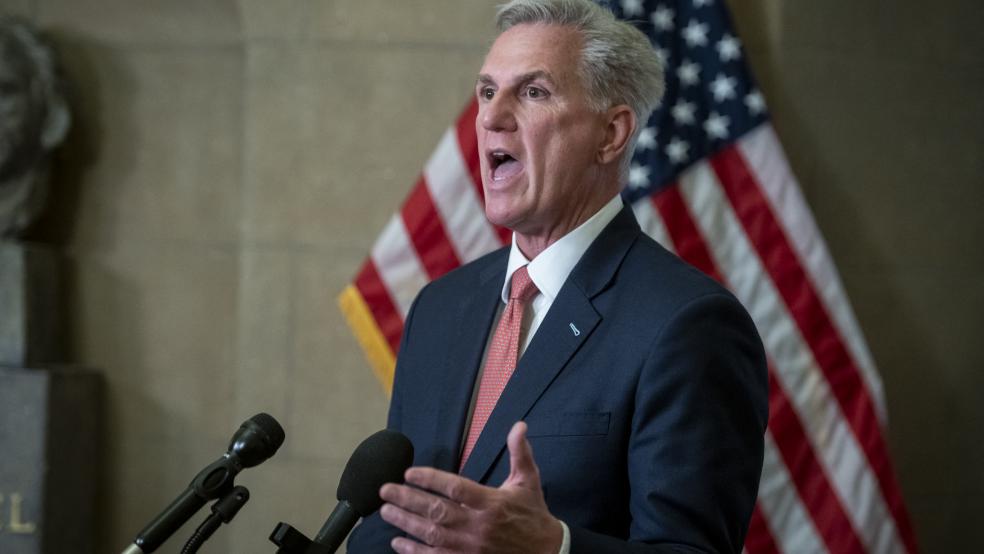Debt-limit talks between the White House and House Speaker Kevin McCarthy have been put on “pause” after Republican negotiators abruptly walked out of the meetings and complained that President Joe Biden’s team was being “unreasonable.”
“We’ve got to get movement by the White House and we don’t have any movement,” McCarthy told reporters. “So yeah, we’ve got to pause.”
McCarthy was not in the Friday meeting, but his lead negotiator, Rep. Garret Graves of Louisiana, told reporters that the talks had reached an impasse. “We’ve decided to press pause because it’s just not productive,” he said, adding that he was not sure if negotiators would be meeting this weekend.
Split on spending levels: McCarthy indicated that the White House was resisting spending cuts: “We can’t be spending more money next year. We have to spend less than we spent the year before. It’s pretty easy.”
Republicans are looking to cut spending by about $130 billion and cap growth at 1% a year for the next decade. The White House reportedly has indicated that it does not want to reduce spending below fiscal year 2023 levels and is instead willing to freeze discretionary spending rather than cut it.
“Spending caps are the major sticking point, although they’re not the only one,” Republican Rep. Dusty Johnson of South Dakota told Politico.
The breakdown is a sharp reversal from the optimism McCarthy had expressed on Thursday, when he told reporters he could see a path to an agreement. The speaker had said that it was imperative to at least reach a deal in principle by this weekend so as to leave the House and Senate enough time to pass the necessary legislation. The Treasury Department has warned that it could run out of cash and be unable to pay its bills as soon as June 1.
The right-wing House Freedom Caucus on Thursday called on McCarthy to end the bipartisan talks until after the Senate passes the bill approved by House Republicans last month to provide a $1.5 trillion increase in the debt ceiling combined with some $4.8 trillion in spending cuts. That legislation would also apply stricter work requirements to food stamps, welfare and Medicaid.
The White House pushes back: “Sources familiar with the White House’s thinking acknowledge that part of the reason for the temporary breakdown in talks is that White House negotiators view the extent of spending cuts House Republicans are pushing for as unacceptable, though the White House has expressed a willingness to cut some spending,” CNN’s Melanie Zanona and Haley Talbot report.
Bloomberg’s Billy House adds that White House aides told Republicans that some GOP demands would lead to mass Democratic defections. Democratic votes — potentially dozens of them — will likely be needed to pass any deal. Progressive Democrats in recent days have been aggressively pressing to ensure that the White House does not agree to certain Republican demands, particularly expanded work requirements.
A White House official reportedly said: “There are real differences between the parties on budget issues and talks will be difficult. The president’s team is working hard towards a reasonable bipartisan solution that can pass the House and the Senate.”
What it means: This could just be a bump on the road to a deal, or it could be a more serious setback.
“Sometimes the breakdown of talks comes just before the breakthrough in these DC negotiations,” Garrett Haake of NBC News noted. “In those cases, walking away is how you show YOUR side how hard you’re fighting for YOUR priorities.”
An administration official told The Washington Post’s Jeff Stein: “A path to a reasonable bipartisan budget agreement is still possible as long as both sides recognize that they won’t get everything they want.”
Right now, it’s not completely clear that that’s the case.
The bottom line: It’s not clear when talks will resume, but time is ticking away. Analysts at Goldman Sachs said Friday that Treasury might be able to make it past June 1 but would likely see its cash levels drop under $30 billion by June 8 or 9.
“At that point, we believe there are even odds that the Treasury exhausts its funds entirely at that point,” Goldman’s Alec Phillips and Tim Krupa told clients. “We are confident that Congress will avoid going past the deadline without action, but there are many paths this could take. The most likely is a full-fledged deal that suspends the debt limit to early 2025 along with spending caps (70% chance). There is a small chance this could be announced over the weekend (10%) but we think a deal is more likely later next week (30%) or shortly before the deadline (30%).”





